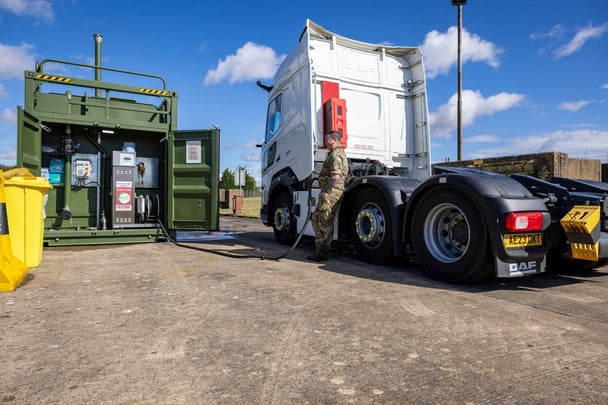
Biofuels: The Future Of Sustainable Transport?
Businesses that delay switching to biofuels risk rising costs and regulatory penalties. CFP Energy urges …
CFP Energy works with large-scale corporates across Europe, supplying biofuels and providing long-term energy transition services.

Our team works with large-scale industrial operators across Europe

All biofuels are verified and quality assured before reaching market

"Accessing biofuels at scale, and at commercially competitive rates, can be a challenge without specialised support.
But finding a reliable, efficient and long-term partner is a major hurdle. Especially when you're looking for one that understands the complexity of your own industry and its unique challenges.
CFP Energy is the solution to this problem.
Working across shipping, aviation, manufacturing and construction, with partners across Europe and beyond, we deliver tailored biofuel strategies that combine market intelligence, regulatory expertise and seamless logistics."
Axel Vanmeulder, Biofuels Specialist
.png)
CFP Energy supplies biofuels across Europe, supporting large-scale corporate operators by delivering state-of-the-art renewable fuels.
We work with across multiple industries, helping to decarbonise the operations of major manufacturers, airline operators, transport and logistics giants and shipping vessel owners.
Combined with specialist support across ETS, CORSIA, CBAM and leading risk management & hedging solutions, CFP Energy has the experience and expertise to fully integrate biofuels into your long-term commercial & sustainability strategy.
-1.png?width=600&height=488&name=Untitled%20design%20(13)-1.png)
This report draws on data from a comprehensive survey conducted by CFP Energy across large-scale organisations in the UK, Germany, and France.
With insights from industries including aviation, data centres, shipping, construction, and manufacturing, the report highlights emerging strategies, investments, and the regulatory pressures driving the need for carbon reduction.
CFP Energy has access to a global network of partners, suppliers and projects that we can provide access to instantly.
Our knowledge and locally certified operations ensure you can get the fuels you need when you need them.
We ensure all fuels are quality assured, carrying our vigorous testing on all biofuels before they reach the market.
We will keep regular comunication with your team, providing updates on supply and delivery year-round.
With dedicated in-house emissions specialists, we can help you track and report the precise emissions you save, ensuring your Scope 1, 2 and 3 reductions are reported clearly and consistently.
We know that your requirements are unique, so our team will do everything in its power to provide you with the environmental solutions that will help you achieve your long-term decarbonisations goals.

Businesses that delay switching to biofuels risk rising costs and regulatory penalties. CFP Energy urges …

The Royal Air Force’s successful five-month trial and Dorset Council’s rollout of Hydrotreated Vegetable …

Ess Mag - CFP’s James Forrest has highlighted Hydrotreated Vegetable Oil (HVO) as a powerful tool in comba…
Yes. Biofuels are considered renewable because they are produced from organic materials that can be replenished on a short-term cycle, unlike fossil fuels that take millions of years to form. Feedstocks such as used cooking oil, tallow, agricultural residues, sugarcane, rapeseed and waste oils can be continually collected, grown or recovered, allowing biofuels to support long-term sustainable energy systems. Most important, waste-based biofuels—like UCOME—offer strong environmental benefits because they transform waste streams into valuable low-carbon energy. Renewable biofuels help reduce reliance on diesel and petrol, cut lifecycle emissions, support circular-economy practices and comply with global regulations such as the EU Renewable Energy Directive (RED), CORSIA and national blending mandates. As industries work toward net-zero targets, renewable biofuels are emerging as a crucial transitional energy source, especially for transport, heavy industry, shipping and aviation where electrification remains challenging.
Biofuels work by replacing or blending with traditional fossil fuels to power engines and industrial systems with lower carbon emissions. They are produced by converting organic feedstocks—such as vegetable oils, used cooking oil, tallow or crops—into fuel molecules through processes like transesterification (for biodiesel) or fermentation and distillation (for bioethanol). These fuels burn similarly to diesel or petrol but release fewer lifecycle greenhouse gases because the carbon emitted during combustion was previously absorbed by the biomass used to produce the fuel. Biofuels can be blended at different ratios (B7, B20, B100, E10, E85) depending on engine compatibility and regulatory standards. They work seamlessly in road transport, off-road machinery, marine vessels and industrial boilers, offering an immediate way to cut emissions without replacing existing engines. By providing a drop-in alternative to conventional fuels, biofuels help businesses reduce carbon intensity and meet sustainability and compliance goals.
Biofuels can be sourced through specialised energy suppliers, distributors and trading companies that handle sustainable fuels such as HVO, biodiesel (FAME), waste-based biofuels, and bioethanol. Leading suppliers provide fuel in bulk, by delivery, or through regional depots, servicing industries including transport, construction, manufacturing, marine and aviation. When sourcing biofuels, it’s important to choose accredited providers who can supply full sustainability documentation, including feedstock origin, carbon intensity values and compliance with frameworks such as RED II, RTFO, ISCC or CORSIA. Businesses often work with renewable fuel partners like CFP Energy to secure reliable supply, competitive pricing and expert support navigating regulatory requirements. Consumers can access lower blends such as E10 petrol or B7 diesel directly at fuel stations. For corporate users, buying through a specialist ensures consistent quality, traceability and long-term availability—critical for decarbonisation planning and ESG performance.
Using biofuels is straightforward because they are designed to function as drop-in or blended replacements for diesel or petrol. Most vehicles and industrial engines can run on low to medium blends—such as B7 or B20 biodiesel, or E10 petrol with bioethanol—without modification. Higher blends, such as B100 or HVO100, are suitable for many commercial fleets, heavy-duty vehicles, generators and machinery, depending on manufacturer approvals. Businesses can use biofuels to reduce emissions across transport operations, construction equipment, off-grid power, marine vessels and heating systems. To use biofuels effectively, organisations typically partner with certified suppliers who provide quality-assured fuel, sustainability documentation and compliance support for schemes like RED, RTFO or national mandates. Storage and handling requirements are similar to conventional diesel, making adoption easy and low-risk. Biofuels offer an immediate pathway to decarbonisation without the cost or disruption of new infrastructure or vehicle replacement.